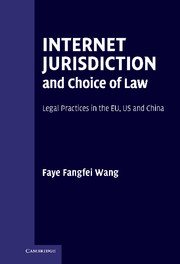Book contents
- Frontmatter
- Contents
- Preface
- List of Abbreviations
- Table of Cases
- PART I Introduction
- PART II Jurisdiction
- 2 Jurisdiction in electronic contracting
- 3 EU rules applied in cyber jurisdiction
- 4 US jurisdiction tests employed in e-contracting disputes
- 5 Chinese legislation on jurisdiction
- PART III Choice of law
- PART IV Online dispute resolution
- PART V The future
- Appendix 1 Council Regulation (EC) No 44/2001 of 22 December 2000 on jurisdiction and the recognition and enforcement of judgments in civil and commercial matters (Brussels I)
- Appendix 2 Regulation (EC) No 593/2008 of the European Parliament and of the Council of 17 June 2008 on the law applicable to contractual obligations (Rome I)
- Bibliography
- Index
5 - Chinese legislation on jurisdiction
from PART II - Jurisdiction
Published online by Cambridge University Press: 03 May 2011
- Frontmatter
- Contents
- Preface
- List of Abbreviations
- Table of Cases
- PART I Introduction
- PART II Jurisdiction
- 2 Jurisdiction in electronic contracting
- 3 EU rules applied in cyber jurisdiction
- 4 US jurisdiction tests employed in e-contracting disputes
- 5 Chinese legislation on jurisdiction
- PART III Choice of law
- PART IV Online dispute resolution
- PART V The future
- Appendix 1 Council Regulation (EC) No 44/2001 of 22 December 2000 on jurisdiction and the recognition and enforcement of judgments in civil and commercial matters (Brussels I)
- Appendix 2 Regulation (EC) No 593/2008 of the European Parliament and of the Council of 17 June 2008 on the law applicable to contractual obligations (Rome I)
- Bibliography
- Index
Summary
Although China is one of the largest export countries in the world and also has a significant amount of cross-border electronic commercial transactions, it currently has no single private international law. In the absence of a uniform statute on private international law, the basic jurisdictional rules in Chinese national laws, such as the Contract Law of the People's Republic of China (hereafter “the contract Law of China” or “CLC”) and the Civil Procedure Law of the People's Republic of China (hereafter “Civil Procedure Law”), are the primary sources. Some subject-specific civil or commercial laws, such as the Foreign Trade Law of the People's Republic of China (hereafter “Foreign Trade Law”), may include provisions that direct the determination of jurisdiction and applicable law in foreign-related commercial and civil matters. Some special judicial arrangements between Hong Kong and mainland China or between Macao and mainland China, such as “the Arrangement between the Mainland and the Hong Kong Special Administrative Region on Reciprocal Recognition and Enforcement of the Decisions of Civil and Commercial Cases under Consensual Jurisdiction” of 2008 (hereafter the “China and Hong Kong Arrangement”) and “the Arrangement between the Mainland and Macao Special Administrative Region on the Mutual Recognition and Enforcement of Civil and Commercial Judgments” in 2006 are also important to facilitate judicial certainty and stimulate trade and cooperation between China and its special administrative regions.
The Chinese economic reform – socialism with Chinese characteristics (known as “Gai Ge Kai Fang” in Chinese) – was started in 1978.
- Type
- Chapter
- Information
- Internet Jurisdiction and Choice of LawLegal Practices in the EU, US and China, pp. 79 - 90Publisher: Cambridge University PressPrint publication year: 2010



